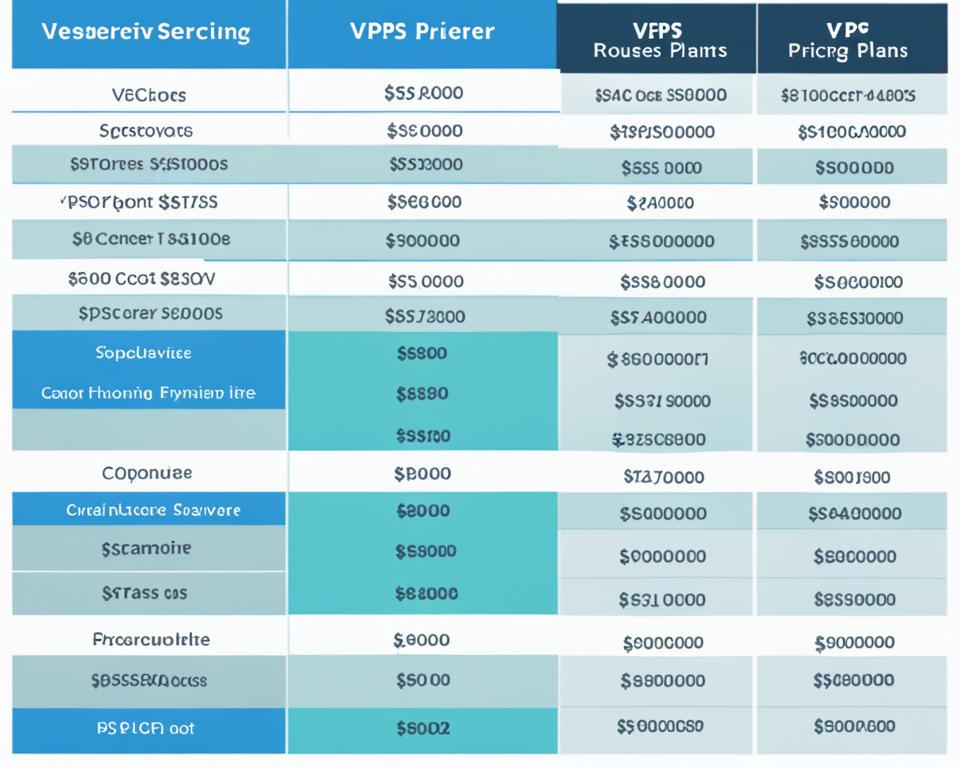A virtual private server (VPS) is a type of hosting that provides dedicated resources to a website, offering enhanced performance compared to shared hosting. It works by leveraging virtualization technology to divide a physical server into multiple virtual machines, each with its own operating system and resources. This allows website owners to have their own private server environment without the high costs associated with dedicated hosting. VPS hosting is a popular choice for businesses looking for better control and flexibility in managing their website.
Key Takeaways:
- VPS hosting provides dedicated resources and enhanced performance compared to shared hosting.
- Virtualization technology is used to create virtual machines with their own operating system and resources.
- VPS hosting offers businesses more control and flexibility in managing their website.
- It is a cost-effective solution compared to dedicated hosting.
- Choosing the right VPS hosting plan requires considering factors like pricing, resource allocation, and technical support.
What Is a Virtual Private Server?
A virtual private server (VPS) is a virtual machine that runs on a physical server shared with other users. However, each VPS is allocated dedicated resources, including CPU power, RAM, and storage, ensuring that the performance of one website does not affect others.
With a VPS, website owners have more control and customization options compared to shared hosting, making it an ideal solution for businesses that require specific configurations and guaranteed resources.
How Does a VPS Work?
VPS hosting utilizes virtualization technology to simulate the experience of having a dedicated server. The hosting provider installs a virtual layer on top of the physical server’s operating system, creating individual compartments called virtual machines (VMs). Each VM can have its own operating system and software, allowing website owners to customize their hosting environment. This virtualization ensures that each VPS has guaranteed resources and operates independently from other users on the same server.
Pros and Cons of VPS Hosting
VPS hosting offers numerous benefits that make it an attractive option for website owners. However, it also has its drawbacks that should be considered. Here are the key pros and cons of VPS hosting:
Pros of VPS Hosting
- Cost-Effectiveness: VPS hosting is more affordable than dedicated hosting, making it a cost-effective choice for businesses and individuals.
- Customization and Control: With VPS hosting, users have full control over server settings and can customize their environment according to their specific needs and preferences.
- Scalability: VPS hosting offers scalability, allowing websites to easily accommodate increased traffic and resource demands as they grow.
- Dedicated Resources: Each VPS is allocated dedicated resources, ensuring reliable performance and preventing other websites from affecting its operation.
These benefits make VPS hosting an attractive option for businesses and individuals who require more control, better performance, and affordable hosting solutions.
Cons of VPS Hosting
- Technical Expertise: Managing a VPS requires technical expertise, as users are responsible for server administration tasks such as software updates, security configurations, and troubleshooting.
- Potential Performance Impact: Improper resource allocation by the hosting provider can impact the performance of a VPS. It is essential to choose a reliable hosting provider that ensures proper resource allocation.
- Not Suitable for Everyone: VPS hosting may not be suitable for websites that do not require advanced customization or have limited technical resources. For some individuals or businesses, shared hosting may be a more suitable option.
Considering these pros and cons will help website owners make an informed decision about whether VPS hosting aligns with their specific needs and goals.
How VPS Compares With Shared Hosting & Dedicated Hosting
When it comes to hosting options, VPS (Virtual Private Server) hosting offers a unique balance between shared hosting and dedicated hosting in terms of performance and cost. Understanding the differences between these hosting options can help businesses make an informed decision that suits their specific needs.
Shared Hosting:
In shared hosting, multiple websites share the resources of a single server. This means that CPU power, RAM, and storage are distributed among the different websites hosted on the server. While shared hosting is a cost-effective option, it does come with some limitations. Since resources are shared, the performance of your website can be impacted if other sites on the same server experience high traffic or resource usage.
Shared hosting is suitable for small websites or blogs with low to moderate traffic volume and minimal customization requirements.
Dedicated Hosting:
In dedicated hosting, you have exclusive access to a physical server, meaning all the resources of the server are dedicated to your website. This ensures optimal performance and allows for extensive customization options. However, dedicated hosting comes at a higher cost and requires technical expertise to manage and maintain the server.
Dedicated hosting is ideal for large websites with high traffic volume, complex applications, and specific configuration requirements.
VPS Hosting:
VPS hosting offers a middle ground between shared and dedicated hosting. Like dedicated hosting, VPS hosting provides dedicated resources such as CPU power, RAM, and storage. However, unlike dedicated hosting, VPS hosting still shares the physical server with other users.
With VPS hosting, each website is allocated a virtual partition within the server, ensuring that the performance of one website does not impact others. This allows for better control, customization, and flexibility compared to shared hosting.
VPS hosting is an ideal choice for businesses that require more resources, higher performance, and improved security than what shared hosting can offer. It provides a cost-effective solution that combines the benefits of dedicated hosting with the affordability of shared hosting.
By choosing VPS hosting, businesses can enjoy dedicated resources, enhanced performance, scalability, and increased control over their hosting environment. Whether you have a growing website, an e-commerce store, or complex applications, VPS hosting provides the stability and reliability you need to succeed.
When Should You Switch To VPS?
There are several signs that indicate it may be time to switch to VPS hosting. These include:
- Concerns about website security: If you have outgrown the security measures offered by shared hosting and need more robust protection for your website and customer data, switching to VPS hosting can provide the enhanced security features you need.
- Experiencing high traffic volume: If your website experiences a significant increase in traffic that shared hosting cannot handle, you may notice slow loading times and poor performance. Upgrading to VPS hosting allows you to have dedicated resources that can better handle high traffic volume, ensuring a smooth user experience.
- Consistent slow website performance: If you notice that your website is consistently slow, even during times of low traffic, it may be a sign that shared hosting is not providing the necessary resources to support your website’s demands. Switching to VPS hosting can provide the performance boost you need.
- The need for advanced features: If your website requires advanced features such as SSL certificates for secure online transactions or specific server configurations for complex applications, VPS hosting offers the flexibility and customization options to meet your needs.
- Businesses that require more control: If you need more control over your hosting environment and specific configurations to support your business requirements, VPS hosting grants you greater control and flexibility compared to shared hosting.
By paying attention to these signs and considering your specific needs, you can determine whether switching to VPS hosting is the right move for your website.
VPS Hosting Benefits
Upgrading to VPS hosting offers several benefits:
- Enhanced performance: With dedicated resources, VPS hosting provides better performance and faster loading times compared to shared hosting.
- Increased security: VPS hosting offers improved security features and a more isolated hosting environment, minimizing the risk of data breaches.
- Scalability: VPS hosting allows you to easily scale your resources as your website grows, ensuring that it can handle increased traffic and user demands.
- Customization options: With VPS hosting, you have more control over your server settings and can customize the hosting environment to meet your specific needs.
Switching to VPS hosting can provide the performance, security, and control required for businesses that have outgrown shared hosting.
VPS Hostings Use Cases
| Industry | Use Case |
|---|---|
| E-commerce | Secure online transactions, handling large product catalogs, and managing high traffic volume. |
| Media and Publishing | Hosting content-heavy websites, streaming media, and managing high website traffic. |
| Software Development | Managing multiple development environments, testing applications, and hosting development repositories. |
| Online Gaming | Providing low-latency gaming experiences, handling high concurrent user loads, and hosting game servers. |
How To Choose The Best VPS Hosting Plan For Your Website?
When it comes to selecting the ideal VPS hosting plan for your website, there are several important factors to consider. By evaluating pricing, resource allocation, scalability options, technical support, and additional features offered by different hosting providers, you can make an informed decision that aligns with your specific needs and requirements. Here are some key considerations to keep in mind:
1. Pricing
Compare the pricing structures of various VPS hosting plans to ensure that they fit within your budget. Look for plans that offer a good balance between cost and the features they provide.
2. Resource Allocation
Assess your website’s resource requirements, including CPU power, RAM, and storage. Choose a VPS hosting plan that offers sufficient resources to support your website’s performance and growth.
3. Scalability Options
Consider the scalability options provided by the hosting provider. Ensure that your chosen plan allows for easy upgrades and additional resources as your website expands and attracts more traffic.
4. Technical Support
Check the level of technical support offered by the hosting provider. Look for providers that offer 24/7 customer support, as well as a comprehensive knowledge base or support documentation to assist you with any technical issues that may arise.
5. Additional Features
Look for additional features or services that can enhance your VPS hosting experience. This may include features like SSL certificates, data backups, website migration assistance, and control panel options.
“Choosing the right VPS hosting plan requires careful consideration of pricing, resource allocation, scalability options, technical support, and additional features. By assessing your specific needs and comparing different providers, you can find the perfect plan that meets your requirements and ensures optimal performance for your website.”
By carefully evaluating these factors, comparing different hosting providers, and reading customer reviews, you can make an informed decision and select the best VPS hosting plan for your website. Remember to consider your specific needs, future growth plans, and desired level of control and customization to ensure that the chosen plan aligns with your requirements.

| Factors to Consider | Rating (out of 5) |
|---|---|
| Pricing | 4 |
| Resource Allocation | 5 |
| Scalability Options | 4 |
| Technical Support | 5 |
| Additional Features | 3 |
Ready for Your Own VPS Hosting?
Now that you’ve made the decision to switch to VPS hosting, it’s important to find a reliable hosting provider that meets your needs. Consider the specific requirements of your website, such as resource allocation, security features, and scalability options. It’s also crucial to ensure that the hosting plan aligns with your budget and offers the key benefits of VPS hosting.
Avoid falling for the trap of choosing the cheapest VPS server pricing without considering the features and benefits it offers. A well-balanced hosting plan should provide competitive pricing combined with a robust set of features. Look for a hosting provider that offers a range of features, such as:
- Dedicated Resources: Make sure the VPS hosting plan provides dedicated resources, such as CPU power, RAM, and storage. These resources are exclusively allocated to your website, ensuring optimal performance and avoiding any negative impact from other users.
- Enhanced Performance: One of the key benefits of VPS hosting is improved website performance. Look for features like SSD storage and advanced caching technologies that can further boost the speed and responsiveness of your website.
- Scalability: Your website’s traffic may grow over time, so it’s important to choose a VPS hosting plan that allows easy scalability. This means you can easily upgrade your resources as your website needs increase without any downtime or disruptions.
- Reliable Support: A reliable hosting provider should offer exceptional customer support. Ensure they provide 24/7 technical assistance to address any issues or concerns that may arise.
- Security Features: Security is crucial for any website. Look for features like SSL certificates and regular backups to protect your website and the data it handles.
By carefully considering these factors, you can choose the best VPS hosting plan that aligns with your website’s needs, offers competitive pricing, and provides the features and benefits that will help your website thrive.
| Hosting Provider | Pricing (Monthly) | Resources | Scalability | Support |
|---|---|---|---|---|
| Provider A | $19.99 | Dedicated CPU, 4GB RAM, 60GB SSD | Vertical & Horizontal | 24/7 Live Chat & Phone |
| Provider B | $24.99 | Dedicated CPU, 6GB RAM, 100GB SSD | Vertical & Horizontal | 24/7 Ticket & Email |
| Provider C | $29.99 | Dedicated CPU, 8GB RAM, 120GB SSD | Vertical & Horizontal | 24/7 Live Chat & Email |
Comparing the pricing and features of different hosting providers will help you make an informed decision and choose a VPS hosting plan that offers the best value for money.
Conclusion
VPS hosting offers businesses a cost-effective solution with a range of benefits, making it a popular choice in the hosting industry. By providing enhanced control, customization, and dedicated resources compared to shared hosting, VPS bridges the gap between shared and dedicated hosting, offering a middle ground for businesses seeking more control over their hosting environment without the high costs associated with dedicated servers.
One of the key advantages of VPS hosting is its ability to provide businesses with greater control and customization options. With a VPS, businesses have the flexibility to configure their server settings and install software according to their specific requirements. This allows website owners to optimize their hosting environment and tailor it to their unique needs.
Furthermore, the dedicated resources allocated to each VPS ensure reliable performance and minimize the risk of resource congestion. Unlike shared hosting, where multiple websites share the same resources, VPS hosting guarantees a certain level of resources, such as CPU power, RAM, and storage. This ensures that one website’s performance does not impact others on the same server.
When considering a hosting plan, businesses should evaluate their specific needs and budget. VPS hosting is a great choice for websites that require more control, customization, and reliable performance. Its use cases include high-traffic websites, online stores that need advanced features like SSL certificates, and businesses that prioritize data security. By understanding the advantages and differences between VPS hosting and other hosting options, businesses can make an informed decision that best suits their website and online presence.
FAQ
What is a virtual private server (VPS)?
A virtual private server (VPS) is a type of hosting that provides dedicated resources to a website, offering enhanced performance compared to shared hosting. It works by leveraging virtualization technology to divide a physical server into multiple virtual machines, each with its own operating system and resources.
How does a VPS work?
VPS hosting utilizes virtualization technology to simulate the experience of having a dedicated server. The hosting provider installs a virtual layer on top of the physical server’s operating system, creating individual compartments called virtual machines (VMs). Each VM can have its own operating system and software, allowing website owners to customize their hosting environment. This virtualization ensures that each VPS has guaranteed resources and operates independently from other users on the same server.
What are the advantages of VPS hosting?
VPS hosting offers several advantages, including cost-effectiveness compared to dedicated hosting, customization and control over server settings, scalability to accommodate growing website traffic, and dedicated resources for reliable performance. However, managing a VPS requires technical expertise, and improper resource allocation by the hosting provider can impact performance. Additionally, VPS hosting may not be suitable for websites that do not require advanced customization or have limited technical resources.
How does VPS hosting compare to shared hosting and dedicated hosting?
VPS hosting sits between shared hosting and dedicated hosting in terms of performance and cost. Shared hosting involves sharing resources with other websites, while dedicated hosting provides exclusive access to a physical server. VPS hosting offers a balance between the two, providing dedicated resources like CPU, RAM, and storage while still sharing the physical server with other users. It combines the control and customization of dedicated hosting with the affordability of shared hosting.
When should you switch to VPS hosting?
There are several signs that indicate it may be time to switch to VPS hosting. These include concerns about website security, experiencing high traffic volume that shared hosting cannot handle, consistent slow website performance, and the need for advanced features like SSL certificates for online stores. Businesses that require more control over their hosting environment and specific configurations can also benefit from upgrading to a VPS.
How do you choose the best VPS hosting plan for your website?
Choosing the best VPS hosting plan involves considering factors such as pricing, resource allocation, scalability options, technical support, and additional features offered by the hosting provider. Businesses should assess their specific needs and future growth plans to ensure that the chosen plan can accommodate their requirements. Comparing different hosting providers and reading customer reviews can also help in making an informed decision.
How do you find a reliable hosting provider for VPS hosting?
Once you have decided to switch to VPS hosting, it’s time to find a reliable hosting provider that offers competitive pricing, a range of features, and excellent support. Consider the specific needs of your website, such as resource requirements, security features, and scalability options. Additionally, ensure that the hosting plan aligns with your budget and offers the necessary benefits of VPS hosting, such as dedicated resources and enhanced performance.




